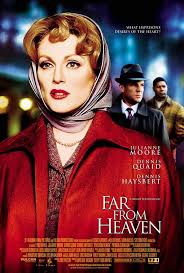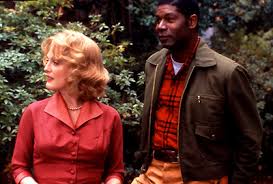There are few subjects as taboo in our society as sexual orientation and race. Even today, after 50 years of increased tolerance, there's still a lot of sensitivity and debate around these subjects. Far From Heaven, Todd Haynes' 2002 film, explores these issues through the lens of the 1950s, when they were much, much more controversial.



Far From Heaven is about Cathy Whitaker (Julianne Moore), a 1950s Connecticut housewife who lives the model suburban life: her husband, Frank (Dennis Quaid), is a successful businessman, and together they have two kids. Cathy has a high position in the neighborhood, and financially they're well-off enough to afford a maid (a then-little-known Viola Davis). But that perfect image begins to unravel when Cathy catches Frank with another man, which leads to the slow dissipation of their marriage and Cathy's affair with Raymond Deagan, an African-American man played by Dennis Haysbert.
There's something to be said about the way the film handles the aforementioned issues. There's definitely an sense of McCarthyism in the air (there are several references to being considered a Communist), preventing many of the characters from accepting the ideas of homosexuals and African-Americans as equals. Cathy has Frank go to a doctor to fix his "ailment," which he too considers to be a disease. And Cathy, though clearly falling for Raymond, must constantly deny any interaction with him so as to not have her image spoiled. Today, things may not be as strict as they were then, but its hard to ignore the fact that the ideas behind those behaviors still exist.
Performance-wise, the film is a winner from the always-radiant Moore, who completely disappears into the role of Cathy. She plays the character as a woman who can't accept the reality of racism or homosexuality, but more importantly is struggling to accept who she really is in relation to these things. Quaid and Haysbert are also strong, particularly the former, who has a complete arc from a man scared of his sexuality to a man who embraces it. And the reliable Patricia Clarkson has a fine role as Cathy's best friend, a far more intolerant woman who's not beyond betraying her friends based on their secrets.
Moore and Haysbert
The real hero of the film, though, is writer/director Todd Haynes. Haynes, whose work also includes the unconventional biopics I'm Not There (in which six different actors, including Cate Blanchett, play Bob Dylan) and Superstar: The Karen Carpenter Story (now unavailable, it was shot completely with Barbie dolls), creates a film that is an homage to the melodramas of the 1950s, particularly those of Douglas Sirk. All of the hallmarks are there: the relatively tame dialogue, the incandescent lighting, the stage-y direction, the color filters, the Elmer Bernstein score (his last original work before his death in 2004). Its brilliant artistic decision, and as a whole lifts the film into an interesting experiment of style.
Comments